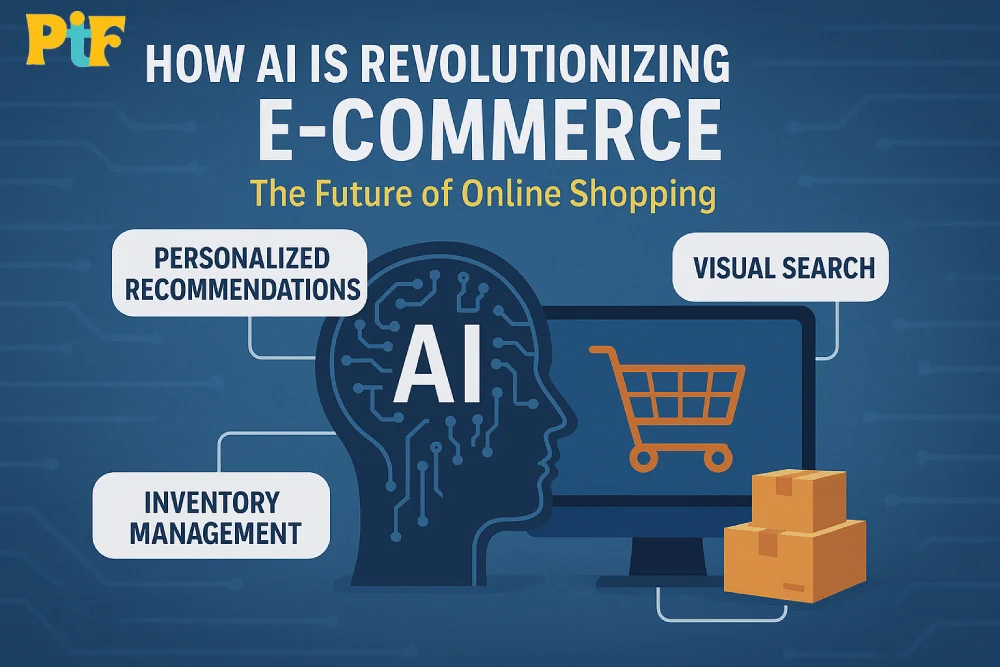How AI is Revolutionizing E-Commerce: The Future of Online Shopping
The e-commerce industry is rapidly evolving, and Artificial Intelligence (AI) is playing a crucial role in shaping its future. From personalized shopping experiences to inventory management, AI is transforming the way businesses operate and how consumers shop. In this post, we’ll explore the top ways AI is revolutionizing e-commerce and how you can leverage it to grow your online store.
1. Personalized Shopping Experience
One of the biggest advantages of AI in e-commerce is the ability to offer personalized experiences for each customer. AI-powered algorithms analyze customer data, such as browsing history, purchase behavior, and preferences, to recommend products tailored to individual tastes.
Why Personalization Matters
- Increased Conversions: Personalized recommendations can significantly increase the chances of a customer making a purchase.
- Customer Satisfaction: By showing customers what they’re most likely to want, AI enhances their shopping experience, making them more likely to return.
- Brand Loyalty: A personalized shopping experience can create a sense of connection, fostering brand loyalty.
How AI Helps:
- Product Recommendations: AI algorithms predict what products customers are likely to buy based on their past behavior.
- Dynamic Pricing: AI can adjust prices in real-time based on demand, competition, and customer behavior, ensuring the best deal for both the customer and the retailer.
2. Chatbots and Virtual Assistants
AI-powered chatbots and virtual assistants are becoming indispensable in customer service. These tools can handle a wide range of tasks, from answering basic customer queries to processing orders and providing real-time updates.
Why Chatbots Matter
- 24/7 Customer Service: AI chatbots can provide support around the clock, helping businesses handle customer queries at any time.
- Quick Response Times: Chatbots can offer instant responses, reducing customer wait time and improving overall satisfaction.
- Cost Efficiency: AI-driven customer support can handle many tasks that would otherwise require human employees, allowing businesses to save on labor costs.
How AI Helps:
- Automated Customer Support: AI can quickly resolve common customer issues, such as tracking orders or processing returns.
- Order Assistance: Virtual assistants can guide customers through the purchasing process, improving conversion rates.
3. Inventory Management and Demand Forecasting
AI is also helping e-commerce businesses manage their inventory more efficiently. AI algorithms analyze sales data, seasonal trends, and customer preferences to predict demand and optimize stock levels.
Why Efficient Inventory Management Matters
- Cost Reduction: By predicting demand accurately, businesses can avoid overstocking or understocking, reducing storage costs and lost sales.
- Improved Customer Experience: AI ensures that popular products are always in stock, leading to fewer missed sales opportunities.
- Faster Replenishment: With AI’s real-time inventory tracking, businesses can replenish stock more quickly and respond to changes in demand.
How AI Helps:
- Demand Forecasting:AI algorithms predict future demand based on historical data and trends, helping businesses plan inventory levels more accurately.
- Automated Replenishment: AI systems can automatically trigger reordering processes, ensuring that businesses never run out of key products.
4. AI-Powered Visual Search
With visual search, customers can search for products by uploading an image, and AI will find similar or identical items in the store’s inventory. This technology is changing how consumers shop, making it easier to find exactly what they’re looking for.
Why Visual Search Matters
- Enhanced Shopping Experience: Visual search allows customers to find products faster and with more accuracy, improving their overall experience.
- Attracting New Shoppers: Visual search appeals to younger generations who are more accustomed to visual platforms like Instagram and Pinterest.
- Increased Conversions: By making it easier to find the right product, visual search can boost conversion rates and sales.
How AI Helps:
- Image Recognition: AI-powered visual search tools analyze the image uploaded by the user and provide relevant product recommendations.
- Improved Navigation: AI can guide customers to products they may have missed, enhancing the shopping journey.
5. AI-Driven Fraud Prevention
E-commerce fraud is a significant concern for online businesses. AI is helping detect and prevent fraudulent activities by analyzing patterns and anomalies in transactions to identify potentially fraudulent behavior.
Why Fraud Prevention Matters
- Security: AI helps keep customer data and transactions safe, reducing the risk of data breaches.
- Cost Savings: By preventing fraudulent transactions, businesses can save money on chargebacks and legal fees.
- Customer Trust: A secure shopping environment enhances customer trust, which can lead to increased loyalty and repeat purchases.
How AI Helps:
- Fraud Detection: AI algorithms analyze transaction data in real time to flag suspicious activities and prevent fraud before it happens.
- Risk Assessment: AI can assess the risk of each transaction and approve or deny payments based on patterns and behaviors.
6. Conclusion: The Future of AI in E-Commerce
AI is no longer a futuristic concept—it’s already revolutionizing the e-commerce industry. By leveraging AI technology, online stores can enhance customer experiences, streamline operations, and increase revenue. As AI continues to evolve, the possibilities for e-commerce are endless, and businesses that adopt these technologies early will have a significant edge over their competitors.
If you’re running an e-commerce store, now is the time to start exploring AI-powered solutions. From personalization to fraud prevention, AI has the potential to transform your business and help you provide a better experience for your customers.
